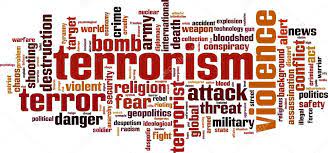PREVENTION OF EXTREMISM AND TERRORISM
In our time, modern society is experiencing a transformation of the system of values due to the modernization of social life. Globalization processes in the economic, political and cultural spheres, involving the population of countries in migration flows of different nature and level lead to the complication of structural ties of specific societies and the community as a whole. These factors to a certain extent stimulate tension in interethnic relations, accompanied by interethnic conflicts, and on this basis various opposition groups are beginning to appear, trying to achieve the desired result through extremism and terrorism.
To successfully confront extremism and terrorism, their prevention in society, it is necessary to know and understand the criminal nature of these phenomena.
Extremism is the commitment of individuals, groups, organizations to extreme, radical views, positions and measures in public activities.
Extremism is diverse, and the motives that give rise to it are also diverse. The main motives are: material, ideological, desire for transformation and dissatisfaction with the real situation, power over people, interest in a new kind of active activity, comradeship, self-assertion, youth romance, heroism, playfulness, attractiveness of mortal danger.
Extremist activity (extremism) is:
· violent change of the foundations of the constitutional system and violation of the integrity of the country;
· public justification of terrorism and other terrorist activities;
· incitement to social, racial, national or religious discord; propaganda of exclusivity, superiority or inferiority of a person on the grounds of his or her social, racial, national, religious or linguistic affiliation or attitude to religion;
· violation of human and civil rights, freedoms and legitimate interests on the basis of a person's social, racial, national, religious or linguistic affiliation or attitude to religion;
· obstruction of citizens' exercise of their electoral rights and the right to participate in a referendum or violation of the secrecy of the vote, coupled with violence or the threat of violence;
· Obstruction of the lawful activities of State bodies, local authorities, election commissions, public and religious associations or other organizations, combined with violence or the threat of violence;
· Public calls for the realization of the above acts or the mass distribution of knowingly extremist materials, as well as their production or storage for the purpose of mass distribution;
· Financing of such acts or other assistance in their organization, preparation and implementation, including by providing training, printing, material and technical resources, telephone and other types of communication or information services.
The political practice of extremism finds expression in various forms of extremist activity, ranging from manifestations that do not go beyond the constitutional framework to such acute and socially dangerous forms as rebellion, insurgency and terrorism.
Terrorism in the legal literature is considered as an extreme form of extremism manifestation. Terrorism is a complex socio-political and criminal phenomenon caused by internal and external contradictions of social development.
Terrorism is a multidimensional threat to the vital interests of the individual, society and the state, one of the most dangerous varieties of political extremism on a global and regional scale.
Terrorism includes several interrelated elements: terrorist ideology (theories, concepts, ideological and political platforms); terrorist structures (international and national terrorist organizations, extremist - right-wing and left-wing, nationalist, religious and other social organizations, organized crime structures, etc.), as well as terrorist practice itself (terrorist activities).
The ideology of terrorism is a set of ideas, concepts, beliefs, targets, slogans that justify the need for terrorist activities and are aimed at mobilizing people to participate in these activities. It is one of the driving forces of terrorism as a phenomenon, encouraging people subjected to it to violent actions, to commit terrorist acts, including sacrificing themselves. It is one of the bases (along with economic, material and technical) for replenishing the resource base of terrorism (terrorist organizations).
It is not by chance that countering the spread of terrorist ideology and intensifying work on information and propaganda support for anti-terrorist activities is one of the main goals of countering terrorism.
Today there are about 200 types of modern terrorist activities. The main ones are: technological terrorism; criminal terrorism; and cyberterrorism. The most dangerous is technological terrorism, which consists in the use or threat of use of nuclear, chemical and bacteriological weapons, radioactive and highly toxic chemical and biological substances, as well as the threat of seizure of nuclear and other industrial facilities that pose an increased danger to human life and health.
One of the key areas in the fight against terrorist manifestations in the public environment is their prevention. It is especially important to carry out such preventive work among young people, since it is precisely this environment, due to a number of different factors, is one of the most vulnerable in terms of exposure to the negative influence of various anti-social and criminal groups. Social vulnerability of young people, frequent maximalism in assessments and judgments, psychological immaturity, significant dependence on other people's opinions - these are just some of the reasons that allow us to talk about the possibility of easy spread of radical ideas among Russian youth.
The prevention of terrorist and other extremist activities includes the preparation and implementation by the State and its authorized bodies of a comprehensive system of political, socio-economic, informational, educational, organizational, operational and investigative, legal, special and other measures aimed at preventing, detecting, suppressing terrorist activities, minimizing their consequences, and identifying and eliminating the causes and conditions contributing to them.
The prevention of extremism and terrorism is not only the task of the State, but also the task of representatives of civil society and every citizen. This work depends on the clear position of political parties, public and religious associations and citizens.
Nosiri Q.N., c.m.s., associate professor of the department of general surgery №1 of ATSMU
translated Ismoilov R.

